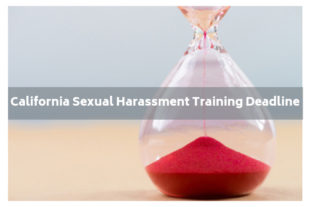 California sexual harassment training laws, deadline extended. If you work for a company that has not trained its employees on the laws regarding sexual harassment in the workplace, the likelihood of such harassment occurring is naturally higher. That is expressly why California sexual harassment training law requires employers to provide this important information to all employees. Recent changes to the law impact the expectations for this training. If you have concerns about sexual harassment, a local labor and employment attorney may be able to help.
California sexual harassment training laws, deadline extended. If you work for a company that has not trained its employees on the laws regarding sexual harassment in the workplace, the likelihood of such harassment occurring is naturally higher. That is expressly why California sexual harassment training law requires employers to provide this important information to all employees. Recent changes to the law impact the expectations for this training. If you have concerns about sexual harassment, a local labor and employment attorney may be able to help.
Importance of Effective Training
Recent allegations of sexual harassment plague the headlines. The failure to provide effective training can lead to employee missteps in the form of improper “jokes,” or even outright threats, intimidations, and written, verbal, or physical assaults. Any of these can make the workplace feel unsafe for employees, and are examples of behaviors that are untenable under California law. While the perpetrator of such actions can be held liable for such actions, employers who fail to address them in a proper and timely fashion are also accountable by law.
New California Sexual Harassment Training Law Deadline
Prior legislation required employers with five or more employees to arrange for a sexual harassment training by 2020. SB 778, which was signed into law in August 2019, extends that deadline to 2021.
California Harassment Training Requirements
The requirements for California sexual harassment training remain the same — two hours of education on the issues for all supervisors within six months of gaining such a position, at least once every two years. The training must speak to issues of abusive conduct according to California law.
Seasonal Employees
Temporary or seasonal workers also must undergo training. This must occur within 30 days or 100 hours of work, whichever comes first, if the worker has been hired to a position that will last six months or less.
Resources
There is no excuse for employers who claim they do not know who to go to for California sexual harassment training materials. The Department of Fair Employment and Housing (DFEH) has been tasked with creating online materials that employers may use. These materials must have an interactive section, necessitating participant interactions wherein they answer questions periodically in order for the program to continue running. When employees have questions throughout the course, the human resources department of the employer is required to address them.
Did Your Employer Fail to Protect You?
While there is no one-size-fits-all training manual, the point is that the core purpose of such training is to create an environment where employees feel safe and can thrive at their jobs. An employer’s California sexual harassment policies should be clear, including procedures for reporting violations, and steps to deal with potential problems. When employers fail to provide this type of training, they leave employees vulnerable to possible attacks, with questions as to recourse. No employee should be left on his or her own to figure out how to deal with sexual harassment. Do you work in Sonoma County, Mendocino County, or Lake County California? If your employer has failed to protect you, the experienced employment law team at Beck Law P.C., will step in to fight for justice on your behalf. Contact us in Santa Rosa today for a confidential consultation.
